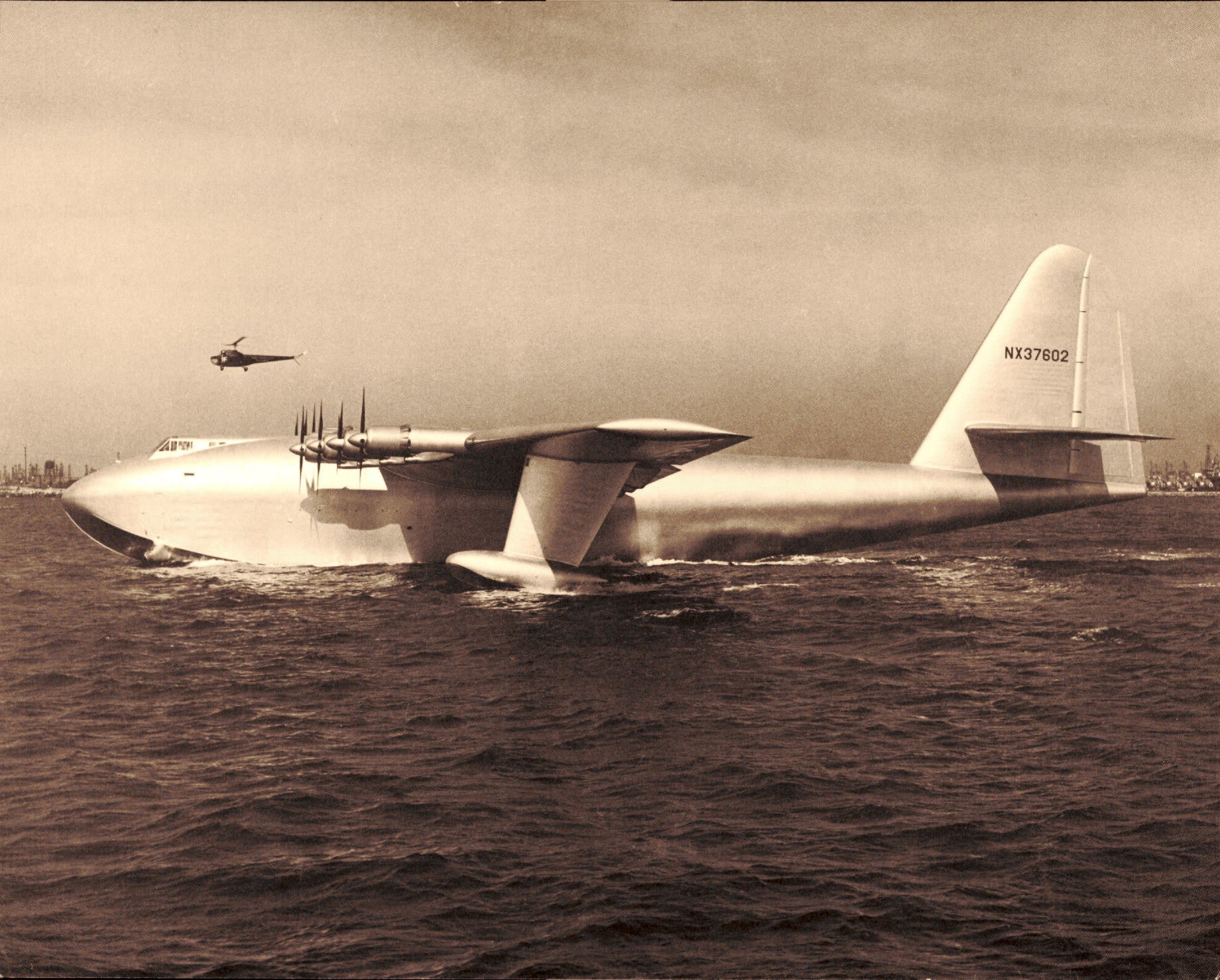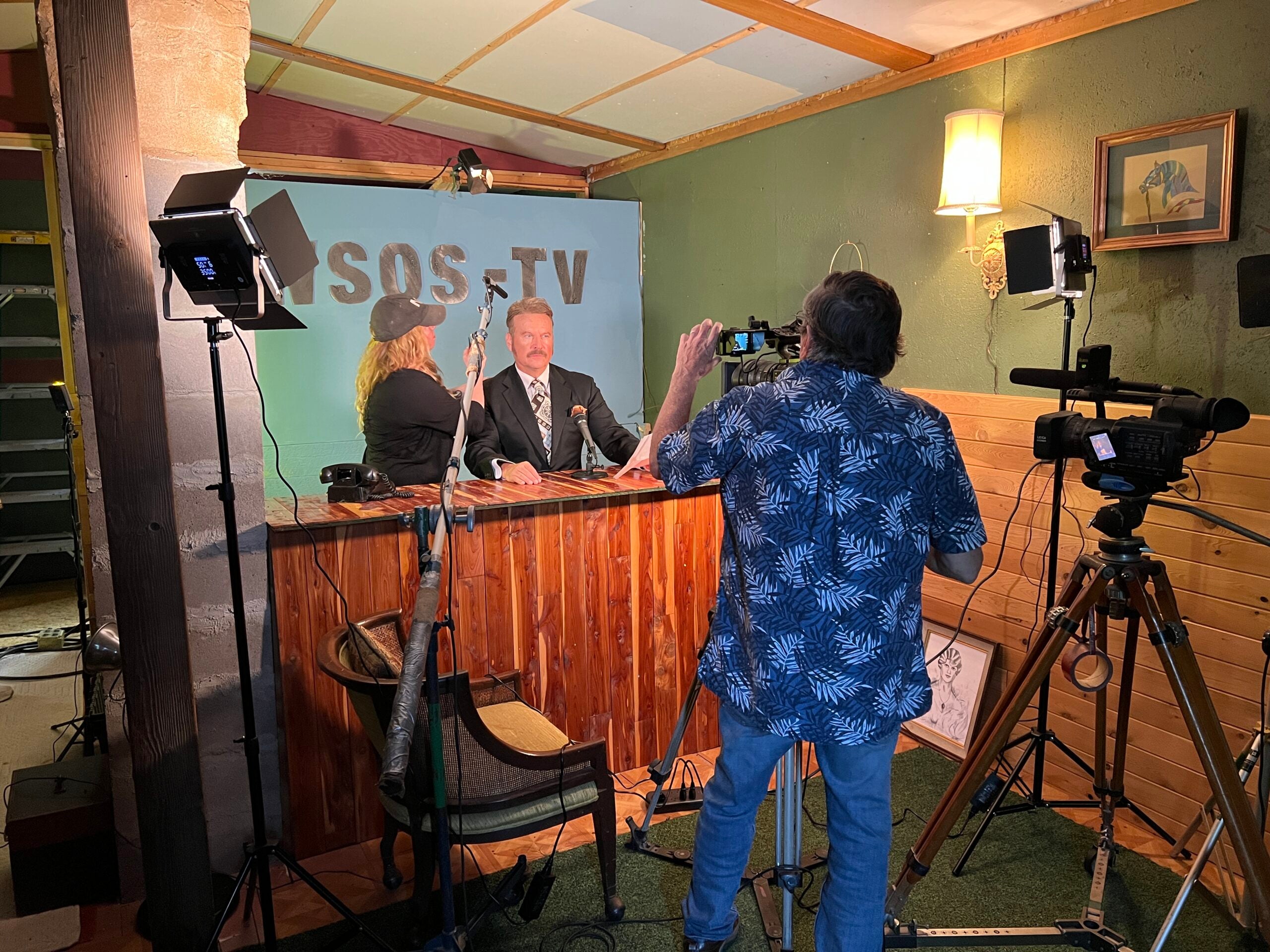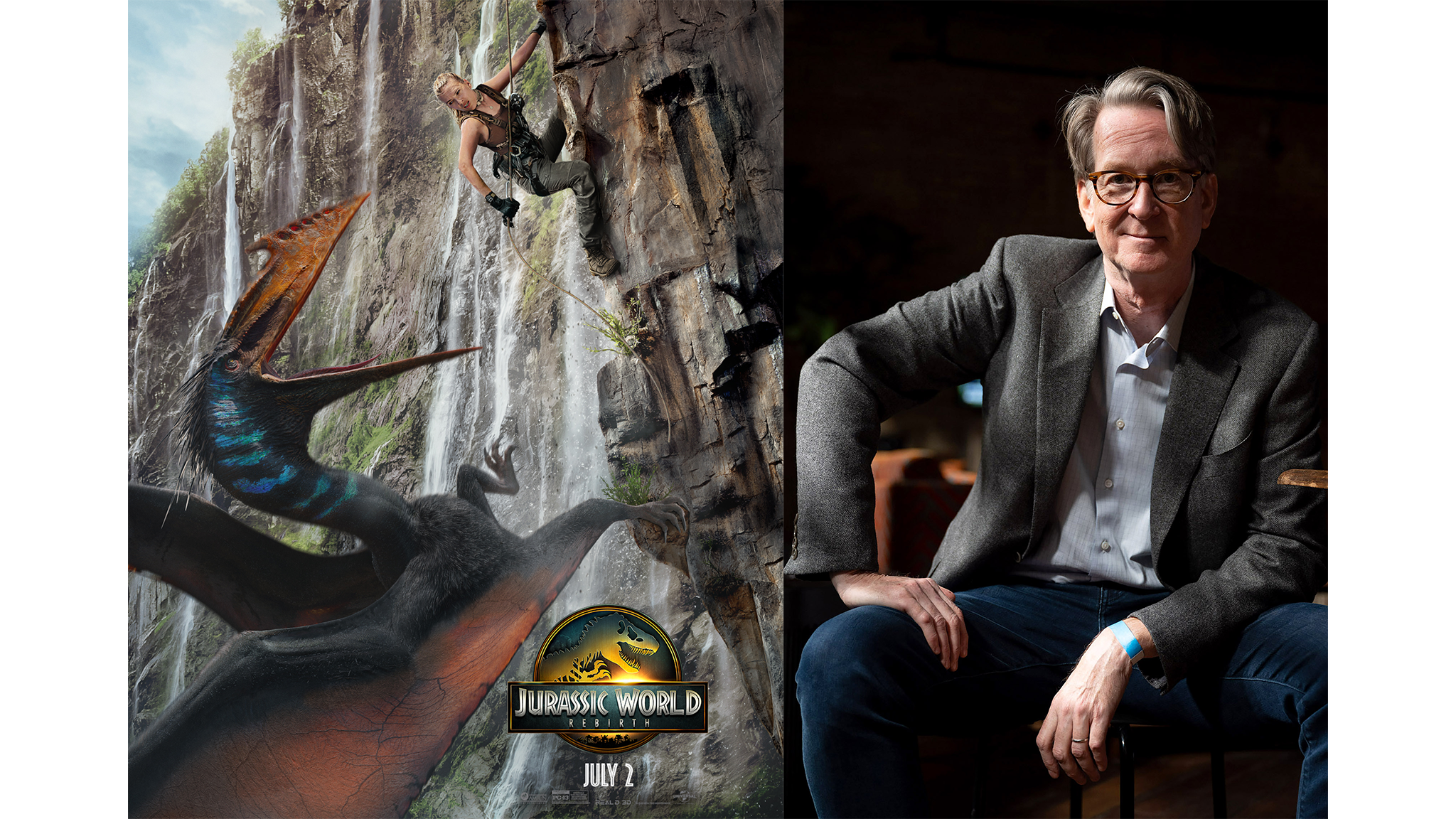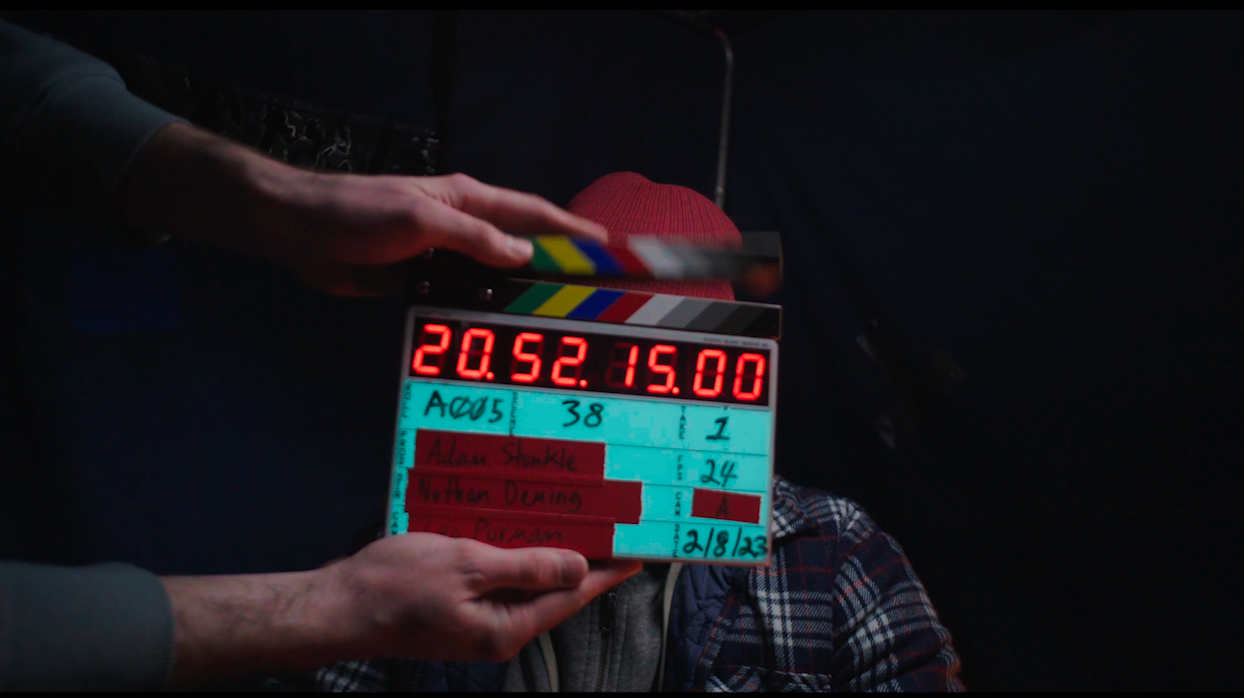Fasten your seat belts and put your tray tables in the upright position. Jim Abrahams joins us to talk about one of the most influential comedy movies of all time, “Airplane!” Also, Wisconsin filmmaker Chris Smith shares the inside story of the Fyre Festival and we learn how Howard Hughes exploited women to make his mark in Hollywood.
Featured in this Show
-
Author: How Howard Hughes Exploited Women To Establish His Movie Career
Editor’s note: This story contains language some may find offensive.
Karina Longworth is the host of the hit podcast, “You Must Remember This,” which explores the secret and forgotten history of vintage Hollywood. Longworth is also the author of the book, “Seduction: Sex, Lies, and Stardom in Howard Hughes’s Hollywood.” The book explores how the millionaire objectified and sexualized women to make his mark as a movie mogul.
As Longworth told WPR’s “BETA,” Hughes was making films in Hollywood during the mid-1920s until the end of the 1950s, “and that’s almost exactly what historians refer to as the classical Hollywood era. So that’s when the studio system is at its peak.”
“It was a time of constant change and evolution, which included Hollywood’s first wave and the studio system; the transition from silent film to sound; the establishment of a censorship board followed by the collapse of that censorship board,” Longworth explained. “You have the Hollywood blacklist which comes about in the late-40s and early-1950s where the studios under pressure from government forces make a big deal about expelling supposed Communists from the industry. And Howard Hughes is involved in all of these things.”
In her book, Longworth argues that Hughes “commodied male desire more blatantly than any mainstream filmmaker of his time and in turn helped produce an incredibly influential, sexualized image of womanhood that has impacted American culture ever since.”
“It’s not like he invented the idea of women being sexy in movies,” Longworth said. “I think that one of the reasons why cinema caught on as it did is this voyeuristic thing that both men and women can have in the audience of looking at beautiful people. That’s an exciting thing to do.
“But up to the point where Howard Hughes is making his first directorial effort, ‘Hell’s Angels,’ which he’s making in the late-1920s and was realized in 1930, the sort of manipulation of the audience’s desires was relatively classy, generally. I mean, there were some small glimpses of nudity in films but generally it was artistically done.”
Longworth said that “Hell’s Angels” is set during World War I and is supposedly about fighter pilots. But Hughes focused the film’s marketing “around the promise of looking at Jean Harlow’s scantily-clad body.”
“He designs this gown for her to wear that is completely threadbare. In black-and-white film, it appears to be the same color of her skin. It’s totally backless. And he sets this climactic scene around her wearing it and dancing with one of the male characters. And he just shoots her with her bosoms heaving.
“The entire marketing campaign is based around the image of Jean Harlow’s body,” she continued. “So you have these posters where there’s a huge painting of her sort of like leaning back in a dress that’s falling off her and teeny-tiny images of airplanes all around her. So he’s selling the body, he’s selling the female body even though that’s not what the movie is really about.”
In 1944, Hughes began work on a Western film called “The Outlaw,” which marked the movie debut of Jane Russell.
The film was a story about Billy the Kid but the marketing focused on Russell’s voluptuous figure. The censorship board gave the “The Outlaw” their seal of approval but they objected to the ways that Hughes promoted his movie.
“Hughes was doing things to market this film that had never been done before,” Longworth said. “He sent a blimp over Los Angeles shaped like a breast. He had a skywriter draw two circles with dots in the air and under it, it said ‘The Outlaw is coming.’ There were newspaper ads in which there were cartoons of a man pinning down Jane Russell, which is essentially the rape scene in the film. And there were drawings of Jane Russell in newspaper ads where it looked like she was wearing no shirt. So it was this kind of thing that the censors pushed back on.”
Longworth said the centerpiece of the film’s marketing was a rape fantasy.
Near the beginning of the film, Billy the Kid meets a young woman named Rio, played by Russell. Rio knows that Billy the Kid killed her brother so she tries to attack him with a pitchfork.
“And Billy the Kid pins her down, gets rid of the pitchfork, and, as punishment for her coming at him with a pitchfork, he rapes her. And you don’t see the sexual violence but you can hear it. You know that he’s thrown her down behind this block of hay, and he’s pinning her down and you hear her struggle. So it’s very clear what’s happening,” Longworth said.
“But then it seems confused because for the rest of the movie, she’s in love with him,” Longworth continued. “And she’s almost a hypnotic slave to him. It completely changes her personality in a way that is extremely unrealistic. And it makes it seem like what Hughes was trying to convey was that if you encounter a feisty, independent woman, you have to tame her.”
Does Longworth see a connection between her book and the current #MeToo movement?
“I finished it actually before the Weinstein revelations came out. Or at least I finished the first draft,” she said. “So, I don’t see it as a #MeToo book at all. It’s not influenced by that movement. This is history, you know, this is stuff that happened a long time ago. If anything, I see parallels not between Howard Hughes and Harvey Weinstein or any of those people but between Howard Hughes and Donald Trump.
“I mean, I see them both as these master manipulators of the media who consistently tell lies and pretend that they’re not, pretend that they’re truth tellers, pretend that they’re rebels, even though they’re completely corporate manipulators. And their attitudes to women, you know, are somewhat similar in that it seems very difficult for both of them to see women as human beings.”
-
Dumpster Fyre: Wisconsin Filmmaker On The Fyre Festival Fiasco
In April 2017, anyone with a social media account was likely aware of the real-time meltdown of the Fyre Music Festival set in Great Exuma in the Bahamas.
Billed as an extravagant, once-in-a-lifetime event that was to be populated with top musical acts, supermodels, influencers, luxury accommodations and fare, attendees who paid top dollar to travel to the “exclusive” fest were treated to canceled performers, zero celebrities, FEMA tents and cheese sandwiches.
Conceived as the brainchild of Fyre Media CEO/entrepreneur Billy McFarland and hip-hop mogul Ja Rule, the fest was to be the biggest promotional event ever to launch their new talent booking app, Fyre. It ended up imploding with thousands of angry attendees and hundreds of thousands of dollars of debt.
“They sold and marketed this luxury festival in the Bahamas on a remote island and it was something that everyone bought into and believed in and wanted to experience,” said Wisconsin filmmaker Chris Smith. “The reality was just something totally different.”
Smith directed the new Netflix documentary, “Fyre: The Greatest Party That Never Happened.” Featuring interviews with dozens of former Fyre employees, contractors, local Bahamians and attendees, the film offers a comprehensive look back at one of the most high-profile frauds in years.
McFarland and Ja Rule made several trips to the Bahamas to attempt to plan the fest. They created a marketing campaign using supermodels and major social media influencers to generate buzz and enthusiasm.

Rapper Ja Rule, left, and Fyre Festival organizer Billy McFarland, right, visit the Bahamas. Photo courtesy of Netflix“They had some of the top models — Instagram models, runway models — that they had brought down and were able to create this façade. It was incredibly well done for the target audience that they were going after,” said Smith.
The hook worked.
The trouble was they were now the dog that caught the car and had to actually pull off the improbable feat of providing what they promised.
Seth Crossno was an attendee featured in the film. He said his arrival to the fest mirrored basically everyone else’s in the sense that it was completely disorganized and immediately clear that they had been sold a bill of goods.
“Finally, Billy stood up on a table and told everybody ‘Go grab a tent’ and that created a free for all that was pretty chaotic and then if you had luggage, you had to go try to find that and it was getting pretty dark outside,” Crossno said in the film.
The impact on the local Bahamian community that had worked relentlessly on the promise of future big pay days was dire. The film focuses on the plight of Maryanne Rolle, a Bahamian restaurateur, who drained her personal savings in excess of $50,000 to feed local workers and contractors who were laboring to build the fest with the understanding that she would be reimbursed afterwards.

Bahamian restaurateur Maryanne Rolle. Photo courtesy of Netflix“I don’t think it was an unrealistic expectation based on the perception of Fyre in the Bahamas. There was a lot of celebrity, a lot of noise,” said Smith. “So, I think that everyone just felt like it was so chaotic because there was so much to do and that everything would work out once the festival had gone off.”
“I don’t even like to talk about the Fyre Festival. Just take it away and just let me start a new beginning, because they really, really hurt me,” Rolle said in the film.
“We did try to interview Billy (McFarland.) We were set up to film Billy once or twice and in the end Billy came back to us and said he wanted to get paid. He said he was being offered $250,000 from another production,” Smith said.
The other production was a competing documentary, “Fyre Fraud,” produced by the streaming service, Hulu. Smith said he has no interest in seeing that documentary given that he has lived the story for the past year, but he did respond to a small bit of controversy raised in the Hulu doc.
The Hulu doc challenged the ethics of Smith’s film because “Fyre” was produced in partnership with Jerry Media, which is the social media agency that helped promote the festival in 2017. Smith admits to collaborating with a lot of people and firms that worked with Fyre Media and said it was the best way to get the inside story.
“We worked with different contractors that had worked for Fyre and we worked with different agencies that had worked with Fyre that had footage which to me was instrumental in telling this story because you got to see this world and experience this world first-hand as opposed to just having talking heads sort of walk you through what happened,” Smith said.
Crossno, who was part of a $5 million settlement, said that as McFarland was awaiting sentencing for defrauding Fyre Media investors, he began another scheme of selling tickets to exclusive events like The Masters golf tournament and the Met Gala through a shell company using the email list of Fyre Festival attendees.
“He convinced a number of people to give him over $100,000 for these tickets that didn’t exist, so he got charged with that as well,” Crossno said.
McFarland is serving a six-year sentence with a three-year probationary period.
-
Wisconsin Filmmaker Jim Abrahams On The Legacy Of 'Airplane!'
Surely Jim Abrahams thinks of himself first and foremost as a filmmaker.
He may be best known for co-writing and co-directing the 1980 blockbuster disaster movie, “Airplane!” but he grew up in Shorewood where he met his longtime creative collaborators, David and Jerry Zucker.
In addition to “Airplane!” the Zucker, Abrahams, Zucker team (referred to as ZAZ) have enjoyed much Hollywood success producing a string of box office hits, “The Kentucky Fried Movie,” “Top Secret!” and “The Naked Gun!” franchise.
The ZAZ team laid down their comedic roots and founded the “Kentucky Fried Theater” while attending the University of Wisconsin-Madison in the late ’60s. The offbeat multimedia comedy show blended improvised sketches with pre-taped video spoofs of movies and commercials of the time, and mostly avoided the political tropes that many groups were mining for material.
Of this process Abrahams told WPR’s “BETA,”:
“There were a bunch of groups in that era who were making political jokes, and there were lots of easy, obvious targets,” Abrahams said. “But that was just never our instinct. Our instinct was always to watch a movie and say, ‘Isn’t’ that silly?’ When we got together it was a very politically-charged time. There is Vietnam, and Nixon, and Black Power, and feminism. But our instinct was always to make fun of the silly stuff in media.”
Abrahams and the Zuckers decided to pack up and move the theater to a revamped warehouse in Los Angeles. There they met film director, John Landis (“Animal House,” “The Blues Brothers”) who thought the theater concept could be made into a feature-length film.
“We invited John Landis to see ‘Kentucky Fried Theater’ and he was the one who suggested, ‘Why don’t you make this into a movie?’ So he gave us a script to copy its form. And it turns out that script was ‘An American Werewolf in London.‘”
“The Kentucky Fried Movie” hit theaters in 1977, a wild romp of unconnected sketches and commercial and film parodies including a salacious spoof of a women-in-prison film, “Catholic High School Girls In Trouble.”
Abrahams reflects on his feelings at the time of putting out such a risque debut as a filmmaker.
“I remember making ‘The Kentucky Fried Movie’ and thinking, ‘Someday I’m going to get married. Someday I’m going to have kids. And someday I’m going to have to explain this to them.’”
The film was an unexpected hit and gave the ZAZ team leverage to pursue directing a large-scale Hollywood production. Continuing their creative process of surveying late-night television for comedic fodder, one night they stumbled upon the 1957 disaster film, “Zero Hour!” a story of a washed-up war pilot named Ted Stryker who is begrudgingly tasked with landing a commercial airliner whose pilots fell victim to food poisoning.
Lifting the film’s plot, character names, and much of the dialog verbatim, the ZAZ team purchased the rights to “Zero Hour!” (for a mere $2,500) and used it as a blueprint for what would eventually become “Airplane!”.
“Zero Hour!” was perfect vehicle for a comedy, “because the story was great, and the characters were great; and all we had to do was hang our jokes on this story, and we can make a movie,” Abrahams said.
Abrahams describes the casting hurdles they had to overcome to present a straight-forward dramatic film, with famous dramatic actors (Peter Graves, Robert Stack, Lloyd Bridges, Leslie Nielsen) delivering often-ridiculous, laugh-a-minute dialog in a deadpan manner.
“The biggest struggle was to cast straight actors as opposed to comedians,” Abrahams said. “At first Paramount (Pictures) was resistant to that idea. They didn’t quite understand why we wanted to do something like that.
“There was something very endearing about those four actors spoofing themselves in the movie. In essence, they had had full careers, and they were kind of having a laugh at their own expense of their own careers.”
“Airplane!” was a box office success, earning it a sequel, and spawning a surge of genre spoof movies throughout the ’80s and ’90s; some of which were written or directed by Abrahams. Abrahams reflects on the movie’s legacy, and if it would be able to be made today.
“I don’t think we’d get away with it,” Abrahams said. “I don’t think we’d get away with those lines. I’ve seen it in the last couple years with an audience. It holds up as well today as it did back then.”
Episode Credits
- Doug Gordon Host
- Adam Friedrich Producer
- Karl Christenson Producer
- Brad Kolberg Producer
- Doug Gordon Producer
- Steve Gotcher Technical Director
- Karina Longworth Guest
- Chris Smith Guest
- Jim Abrahams Guest
Wisconsin Public Radio, © Copyright 2026, Board of Regents of the University of Wisconsin System and Wisconsin Educational Communications Board.





